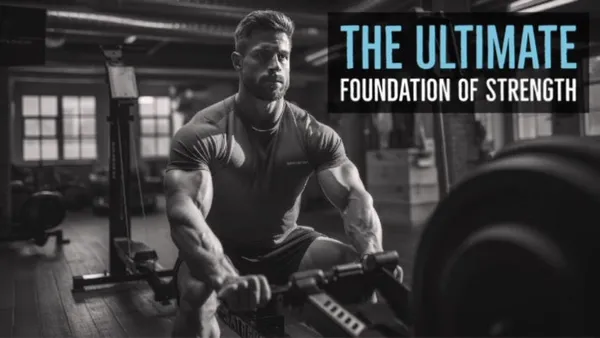Table of Contents
If you're serious about taking your calisthenics training to the next level, then you know that nutrition plays a critical role in achieving advanced skills. At kizworld, we believe that having a low body weight makes movements easier, and eating the right way is essential to achieve and maintain a lean physique. In this article, we'll dive into the world of Calisthenics nutrition tips to help you unlock your full potential.
Calisthenics Nutrition Tips: Fuel Your Strength & Skills
Calisthenics Nutrition Tips for Optimal Performance
Eating Right for Calisthenics Success
When it comes to calisthenics, nutrition is like the fuel in your car. Without the right kind of fuel, your body won't perform at its best. Eating the right way is essential to achieve and maintain a lean physique, which is necessary for more complex calisthenic skills.
Balanced Diet for Continued Progress
A balanced diet that provides adequate nutrition without excessive calories is vital for continued progress in calisthenics training. Overeating can cause weight gain, bloating, stomach discomfort, and lethargy, making it harder to train consistently.
Calisthenics Nutrition Tips for Optimal Performance
Understanding Your Calorie Needs for Calisthenics Training
As a calisthenics enthusiast, I've learned that understanding your calorie needs is crucial for optimal performance. Think of calories like fuel for your car - without the right amount, you won't perform at your best.
Determining Your Daily Caloric Intake
To determine your daily caloric intake, you need to estimate your Basal Metabolic Rate (BMR). This is the minimum number of calories needed for basic bodily functions. Then, adjust your calorie intake based on your activity level and frequency of calisthenics training.
Activity Level | Caloric Adjustment |
|---|---|
+10-20% above BMR | |
+20-30% above BMR | |
+30-50% above BMR |
For example, a 150-pound male beginner should aim for 2,300-2,700 calories per day, while a 130-pound female intermediate should target 1,800-2,100 calories.
Can Calisthenics Make You Bigger?
The Importance of Protein in Calisthenics Nutrition
- Fish: salmon, tilapia
- Meat: chicken breast, turkey breast
- Eggs
- Dairy: milk, Greek yogurt
- Nuts and seeds: almonds, chia seeds
- Veggie options: tofu, tempeh-li>
Are Calisthenics Good for Building Muscle? Understanding Your Calorie Needs for Calisthenics Training
Macronutrient Balance and Hydration for Effective Workouts
Fueling Your Body for Strength and Endurance
Think of your body like a high-performance sports car. It needs the right blend of fuel to perform at its best. Macronutrients – proteins, carbohydrates, and fats – are the fuel that powers your calisthenics workouts. Proteins are like the engine oil, keeping your muscles healthy and helping them recover after a tough training session. Carbohydrates are like the gasoline, providing the energy you need to power through those intense sets. And healthy fats are like the transmission fluid, keeping everything running smoothly and lubricating your joints.
You want to make sure you're getting a good balance of all three macronutrients to fuel your calisthenics training. For example, if you're training for a muscle-building challenge, you might want to increase your protein intake to help your muscles grow stronger. Or, if you're training for a high-intensity workout, you might want to increase your carbohydrate intake to provide you with the energy you need to push yourself harder.
- Proteins: Chicken breast, fish, eggs, Greek yogurt, tofu, tempeh
- Carbohydrates: Whole grains, fruits, vegetables, quinoa
- Healthy Fats: Avocados, nuts, seeds, olive oil
Hydration: The Unsung Hero of Calisthenics
Hydration is like the coolant in your car - it keeps everything from overheating. When you're training, your body loses water through sweat. You need to replenish those fluids to keep your body temperature regulated and your performance at its peak. Dehydration can lead to fatigue, muscle cramps, and even dizziness.
I always make sure to have a water bottle with me during my calisthenics workouts. I sip on it throughout the session and make sure to drink plenty of water after I finish. You might also want to consider adding electrolytes to your water, especially if you're training for a long time or in hot weather. Electrolytes are minerals like sodium, potassium, and magnesium that are lost through sweat. Replenishing them can help you stay hydrated and avoid cramping.
Time of Day | Hydration Tip |
|---|---|
Before workout | Drink 16-20 ounces of water |
During workout | Sip water every 15-20 minutes |
After workout | Drink 16-20 ounces of water |
Macronutrient Balance and Hydration for Effective Workouts
Common Challenges and Strategies for Success in Calisthenics Diet
The Struggle is Real: Consistency is Key
Let's be honest, sticking to a healthy eating plan isn't always easy. I know I've been there. One minute you're crushing those pull-ups, the next you're tempted by that giant chocolate chip cookie. It's like having a tug-of-war with your willpower. But trust me, it's all about finding your groove. Just like mastering the human flag takes time and practice, so does building healthy habits.
A big challenge I've faced is finding the time to cook healthy meals. When you're juggling work, school, and workouts, it's easy to grab the nearest fast food option. But I've learned that a little planning goes a long way. I try to cook a big batch of healthy meals on the weekend, so I've got ready-to-go options for the rest of the week. It's like having a secret weapon in my nutrition arsenal.
- Meal prepping is like having your own personal calisthenics training squad, always ready to support your goals.
- Cook once, eat all week, it's a win-win!
Mastering the Mental Game
Another challenge is the mental game. It's like you're training not only your body, but your mind too. You're constantly battling those cravings and temptations. Sometimes, it feels like you're fighting a losing battle.
I've learned that it's all about finding a balance. It's okay to indulge in your favorite treats sometimes, just don't let them take over your life. It's like mastering the handstand - you need to find that sweet spot between challenge and comfort.
Think of it this way: You wouldn't skip your calisthenics workout just because you're feeling tired, right? Well, the same goes for your nutrition.
Mindset | Example |
|---|---|
Focus on Progress | Celebrate small victories, like choosing water over soda or swapping fries for a salad. |
Be Kind to Yourself | Don't beat yourself up if you slip up. Just get back on track with your next meal. |
Common Challenges and Strategies for Success in Calisthenics Diet
Personalizing Your Approach to Achieve Sustainable Progress
Finding What Works for You
When it comes to calisthenics nutrition, there's no one-size-fits-all solution. What works for someone else might not work for you, and that's okay! The key is to experiment and find what fuels your body best. Think of it like trying out different types of exercises - you need to find what gets you excited and motivated.
I remember when I first started doing calisthenics, I thought I had to follow a super strict diet. But then I realized that wasn't sustainable for me. So, I started making small changes, like cutting down on sugar and increasing my protein intake. And guess what? It worked! My energy levels went up, and I could do more reps than before.
>
>
Making Healthy Choices a Habit
The biggest challenge in sticking to a healthy diet is making it a habit. It's easy to get caught up in the excitement of starting something new, but the real test is whether you can sustain it in the long run. That's why I recommend setting small goals for yourself and celebrating your wins along the way.
Can Calisthenics Make You Bigger?.
I also believe in being kind to yourself when you slip up. Remember, it's not about perfection; it's about progress. Don't be too hard on yourself if you miss a meal prep or indulge in your favorite treat.
- Create a meal prep schedule that works for you
- Pack healthy snacks with you on-the-go
- Treat yourself occasionally without guilt
Remember, finding the right balance of nutrients and habits takes time and patience. Be gentle with yourself, stay consistent, and celebrate those small victories along the way!
Nutrient | Food Source |
|---|---|
Protein | Chicken breast, fish, eggs |
Brown rice, whole wheat bread, fruits |
Personalizing Your Approach to Achieve Sustainable Progress
Final Thought
In conclusion, finding a personalized approach to nutrition that balances fitness goals with daily life is key to sustainable progress in calisthenics. By understanding your calorie needs, balancing macronutrients, staying hydrated, overcoming common challenges, and adopting an 80/20 rule, you'll be well on your way to achieving optimal performance in your calisthenics training.